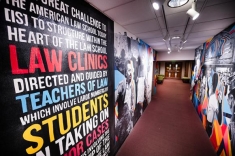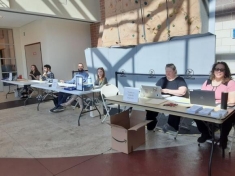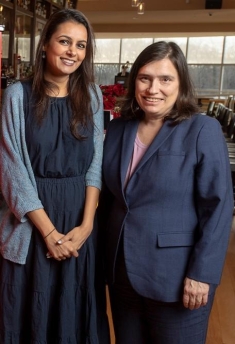
Newark
The New Jersey State Bar Foundation awarded more than $4 million in multi-year grants to fund new and existing law school clinics at Rutgers Law School in both Camden and Newark.
In keeping with the foundation’s mission of advancing the profession of law through public service, more than $6.4 million in new funding provided will support 14 clinics at Rutgers and Seton Hall law schools in New Jersey.
“Clinics give law students practical experience in providing legal aid in the areas of public service, social justice, gender justice, family law, mediation, entrepreneurship and more,” said Charlie Stoia, president of the New Jersey State Bar Foundation. “We are thrilled to provide funding to help prepare students for the practice of law.”
In Rutgers Law's Clinical Program, about 250 law students provide pro bono legal services to over 500 clients each year. With the new grant funding, approximately 50-60 more clinical law students will be able to participate in the clinics each year and support additional clients.
Under the supervision of faculty, staff attorneys, and fellows, law students will educate and provide free legal services for the communities that their university-based clinics serve. Students work on real cases and work with underrepresented individuals or organizations, such as veterans, victims of domestic violence, victims of human trafficking, and small business owners.

Salvation Army's Kroc Center in Camden
Working in a clinic complements other aspects of legal education. Students work in an area of interest, engage with clients, and develop real skills with the support and supervision they need. Law school officials called the funding transformative.
“Rutgers Law School extends our deepest gratitude to the New Jersey State Bar Foundation for its generous commitment to our life-changing clinical programs,” said Johanna Bond, Rutgers Law School Dean. “This funding allows us to continue providing the highest caliber legal training for our clinical students, support innovation for clinical professors, and ensure a positive impact on the communities we serve.”
“We are proud to support the growth of law clinics in New Jersey’s law schools and look forward to continuing for years to come,” said Stoia. “The foundation has supported clinics in prior years, but these grants mark the most robust investment in its history.”
These grant awards are made possible by funding from the IOLTA Fund of the Bar of New Jersey. More about the New Jersey State Bar Foundation’s grants and co-sponsorships can be found at https://njsbf.org/about-njsbf/opportunities-for-funding/cosponsorship-pr...

Education, and Joanne Gottesman, Director of
Clinical Programs
What the Funding Means
Joanne Gottesman, Director of Clinical Programs, Director of the Immigrant Justice Clinic, and Clinical Professor of Law at Rutgers Law School in Camden: “The NJSBF has generously supported Rutgers’ clinical programs for decades, but the size and duration of this new commitment make it particularly transformative. This strategic investment will positively impact many lives, including clients, law students, and future clinical professors.”
Anju Gupta, Associate Dean for Clinical Education, Director of the Immigrant Rights Clinic, and Professor of Law at Rutgers Law School in Newark: “We are so grateful for this funding from the New Jersey State Bar Foundation. The funding will allow us to open a new mediation clinic to serve individuals seeking employment or housing accommodations. The funding will also allow us to expand our existing human rights and community development work and to significantly increase the number of students mentored in the clinics.”
Chakeema Cruickshank ‘24, RU Law Camden: “The Expungement Law Project was the most fulfilling experience of my law school journey. I gained hands-on experience working with clients and learned much about the expungement process. These invaluable experiences will enhance my legal career by improving my oral advocacy skills and helping me connect with future clients.”
Hayley Schultz ‘24, RU Law Newark: “My experience in the immigrant rights clinic was by far the highlight of law school. Having the opportunity to see how a case moves through the courts and work on a 3rd Circuit appeal in real time is something no class could have ever taught me.”